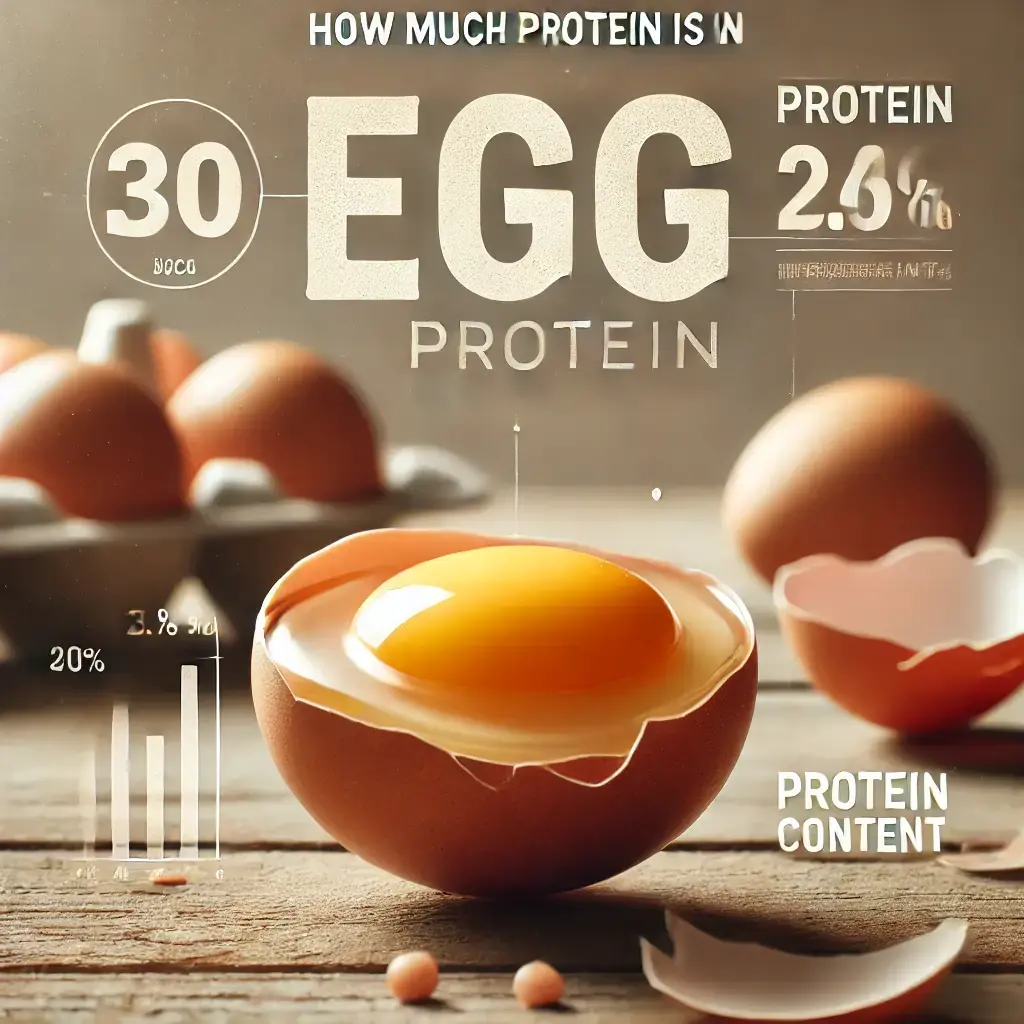Struggling to figure out how to get enough protein in your diet? Eggs might just be your answer! Affordable, versatile, and packed with nutrients, eggs are a true superfood. But have you ever wondered, how much protein is in an egg?
Knowing this can help you plan your meals better, especially if you’re trying to build muscle, lose weight, or just improve your overall health. Eggs are affordable and packed with nutrients besides protein, making them a great choice for daily nutrition.
Let’s crack open the facts and discover how much protein in an egg can benefit your diet!
How Much Protein Is in an Egg?
Not all eggs have the same amount of protein. It depends on how big the egg is. Here’s a quick breakdown:
|
Egg Size
|
Weight (g)
|
Protein Content (g)
|
|
Small
|
38
|
4.8
|
|
Medium
|
44
|
5.5
|
|
Large
|
50
|
6.3
|
|
Extra Large
|
56
|
7.0
|
|
Jumbo
|
63
|
7.9
|
A large egg, which most people buy, has about 6.3 grams of protein. That’s a good chunk, considering most adults need about 0.8 grams of protein for every kilogram they weigh each day.
If you prefer to eat your eggs raw, the protein content stays the same as listed above. Raw or cooked, the size of the egg determines how much protein you get.
What Makes Eggs a Good Source of Protein?
Eggs are an example of nature’s perfect protein source. They are cheap, easy to prepare, versatile, and, of course, loaded with protein. Their complete amino acid profile sets them apart, as they contain all the essential amino acids that our bodies do not produce.
USDA conducted a study and found that large eggs contain approximately 6.3 grams of quality protein. Egg proteins are easily digested, and that is why we use them effectively. Eggs are also high in protein and low in calories. And to be honest, they are delicious and can be cooked in different ways.
Health Benefits of Egg Protein
Egg protein isn’t just about meeting your daily needs. It’s good for your health in many ways. Let’s look at some of these benefits:
1. Muscle Building and Repair
Egg protein has all the essential amino acids your muscles need to grow and fix themselves. This makes eggs great for athletes and people who like to work out.
2. Weight Management
The protein in eggs can help you manage your weight. It makes you feel full and can help you eat fewer calories overall.
-
Speeds up your metabolism
-
Reduces hunger and cravings
-
Helps keep your muscles while you lose weight
3. Brain Health
Eggs contain a lot of choline, which is important for brain health and function.
-
Helps with memory and learning
-
Helps make brain chemicals
-
Might help keep your brain healthy as you get older
Final Thoughts
So, how much protein is in an egg? Well, a large egg has about 6.3 grams of protein. That’s great for helping you meet your daily protein needs. Eggs are a nutritional powerhouse. They give us a lot of high-quality protein in a small package. Whether you’re an athlete, trying to lose weight, or want to be healthier, eggs can be a great addition to your diet.
And hey, share this egg-cellent info with your friends and family. If you want personalized advice about your diet, talk to a registered dietitian.
Read Also How Many Calories Are in Eggs: Nutrition
Frequently Asked Questions
Are egg whites better for protein than whole eggs?
Egg whites have less calories, but whole eggs have more nutrients. Both have good protein, so choose based on what you need.
Is it okay to eat eggs every day?
For most people, 1-2 eggs a day is fine and good for you. But if you have health concerns, ask your doctor.
How do eggs compare to other proteins?
Eggs are a complete protein, like meat, fish, and dairy. They have more protein than many plant sources.
Does cooking change the protein in eggs?
Cooking doesn’t really change the amount of protein, but it can make it easier to digest and kill harmful bacteria.
Do brown eggs have more protein than white eggs?
No, the color of the shell doesn’t affect the protein. Brown and white eggs are pretty much the same nutritionally.
How many eggs should I eat for my daily protein?
It depends on your diet and protein needs. For many adults, 2-3 eggs can give a good amount of your daily protein.



